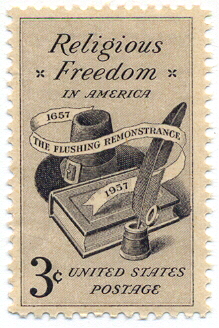 |
| U.S Postage Stamp, 1957 (Photo credit: Wikipedia) |
A Kentucky judge has validated a printing company’s discrimination against an LGBT group under the state’s “Religious Freedom Restoration Act” (RFRA).
The case in question dates back to 2012, when Hands On Originals and its owner, Blaine Adamson, refused to produce T-shirts for the the Gay and Lesbian Services Organization (GLSO), which coordinates the Lexington Pride Festival. GLSO filed a complaint, and the Lexington-Fayette Urban County Human Rights Commission ruled that Hands On Originals (HOO) violated the city’s nondiscrimination order, which protects sexual orientation.
But Kentucky Circuit Court Judge James Ishmael overturned the Commission’s ruling, arguing that it impeded HOO’s freedoms of speech and religion. In terms of speech, Ishmael reasoned that the decision not to print was not because of the sexual orientation of GLSO or its members, but because the Pride Festival advocates “sexual activity outside of a marriage between one man and one woman.” In other words, that message, though inherent to the identity of gay, lesbian, and bisexual people, overrides the right of those people to be protected from discrimination.
Moreover, Ishmael ruled that the Commission’s ruling violates HOO’s protections under Kentucky’s “Religious Freedom Restoration Act” (RFRA), passed in 2013. The law, a simpler version of the more controversial bills introduced recently in Indiana, Arkansas, and other states, states that “government shall not substantially burden a person’s freedom of religion” except under limited circumstances. As Ishmael noted, Kentucky’s definition of “person” includes corporate bodies and other companies, so HOO was entitled to assert a claim under RFRA. “The Commission’s Order substantially burdens HOO’s and its owners’ free exercise of religion,” he wrote, “wherein the government (Commission) punished HOO and its owners by its order for exercising their sincerely held religious beliefs.” Because the shop would have been forced to “print shirts that convey messages contrary to their faith,” the Order “inflicts a substantial burden on their free exercise of religion.”
No comments:
Post a Comment